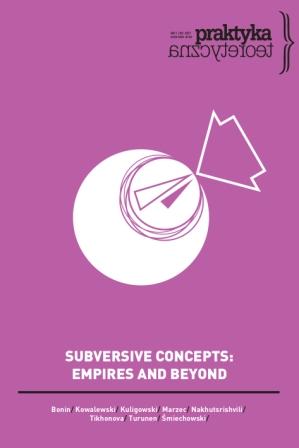Peasant Oaths, Furious Icons and the Quest for Agency: Tracing Subaltern Politics in Tsarist Georgia on the Eve of the 1905 Revolution. Part II: Agents and Items of (Counter)Insurgent Political Theology on the Imperial Borderland
Peasant Oaths, Furious Icons and the Quest for Agency: Tracing Subaltern Politics in Tsarist Georgia on the Eve of the 1905 Revolution. Part II: Agents and Items of (Counter)Insurgent Political Theology on the Imperial Borderland
Author(s): Luka NakhutsrishviliSubject(s): Political history, Social history, Politics and religion, Pre-WW I & WW I (1900 -1919), Eastern Orthodoxy, History of Religion
Published by: Uniwersytet im. Adama Mickiewicza w Poznaniu
Keywords: agency; intelligentsia; oath; Orthodox icons; peasantry; political theology; Russian Empire; secular studies; speech-act; subaltern;
Summary/Abstract: This two-part transdisciplinary article elaborates on the autobiographical account of the Georgian Social-Democrat Grigol Uratadze regarding the oath pledged by protesting peasants from Guria in 1902. The oath inaugurated their mobilization in Tsarist Georgia in 1902, culminating in full peasant self-rule in the “Gurian Republic” by 1905. The study aims at a historical-anthropological assessment of the asymmetries in the alliance formed by peasants and the revolutionary intelligentsia in the wake of the oath as well as the tensions that crystallized around the oath between the peasants and Tsarist officials. In trying to recover the traces of peasant politics in relation to multiple hegemonic forces in a modernizing imperial borderland, the article invites the reader to reconsider the existing assumptions about historical agency, linguistic conditions of subjectivity, and the relationship between politics and the material and customary dimensions of religion. The ultimate aim is to set the foundations for a future subaltern reading of the practices specific to the peasant politics in the later “Gurian Republic”. The second part of the article delves into Uratadze’s account of the aftermath of the inaugural oath and the conflicts it triggered between peasants, intelligentsia and the Tsarist administration.
Journal: Praktyka teoretyczna
- Issue Year: 2021
- Issue No: 39
- Page Range: 43-72
- Page Count: 30
- Language: English

